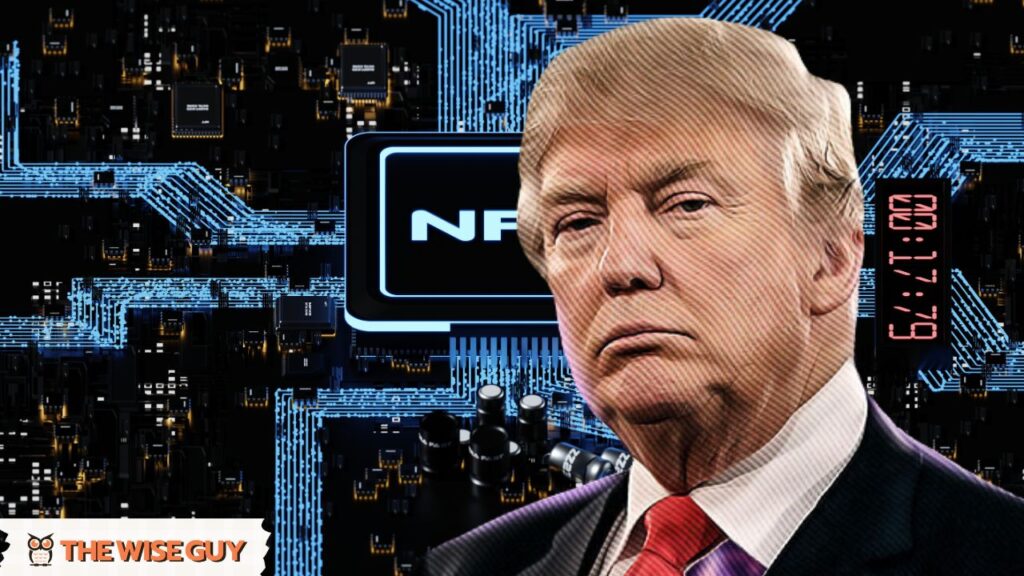???? GM,
Grab your favorite beverage (even if it’s a little early, we won’t tell), and get ready for the juiciest headlines that have been lighting up the Internet this week! ????
????Bitcoin Who? No Mention of BTC in GOP Debate
????Indictment News Sparks Sky-High Surge for Donald Trump’s NFTs, What’s Next
????Crypto Steroids Scheme Lands ‘JuicePal’ an 8-Year Prison Sentence!
????Editor’s Wrap: Tornado Cash Devs Find Themselves Caught in U.S. Legal Maze, Can They Escape?

What Bitcoin? GOP Debate Did Not Even Mention BTC Once

Crypto enthusiasts were eagerly waiting for Wednesday night’s epic showdown among the Republican candidates for the 2024 presidential election. ???? But guess who didn’t show up? Yep, former President and Ethereum whale, Donald Trump, decided to skip the live action and go for a pre-recorded interview on X (formerly known as Twitter).
The debate was supposed to be a crypto lover’s dream, a chance to hear some fiery discussions about Bitcoin and the future of digital currencies. But the moderators seemed to have forgotten to mention the magic word “Bitcoin” throughout the entire two-hour-long debate! ????
On the stage, we had an interesting mix of candidates. We’re talking about Doug Burgum, the speedy Governor of North Dakota; Chris Christie, the former Governor who knows how to make a statement; Ron DeSantis, the surfing Governor of Florida with a pro-Bitcoin vibe; Nikki Haley, the former U.N. Ambassador who knows her way around diplomacy; Asa Hutchinson, the former Governor who’s ready to shake things up; Mike Pence, the former Vice President who’s got his sights set on something big; Vivek Ramaswamy, the entrepreneur fighting for sound money and shaking his fist at the Federal Reserve; and Tim Scott, the Senator from South Carolina.
Now, we were expecting DeSantis and Ramaswamy to drop some Bitcoin knowledge bombs during the debate, but it seems like the moderators missed that memo. While topics like abortion and climate change took center stage. Come on, guys – we’re hungry for some crypto talk! ????
Ramaswamy didn’t let the lack of Bitcoin discussion discourage him, though. He’s been on a mission to reform the U.S. central bank, criticizing the Federal Reserve, opposing those CBDCs (central bank digital currencies), and voicing his concerns about that proposed 30% excise tax on crypto mining. He’s even calling on conference-goers to donate Bitcoin to fuel his campaign and make the 2024 election a “referendum on sound money in the United States.” ????
Not to toot his own horn, but Ramaswamy claims he’s the only candidate who truly understands the ins and outs of Bitcoin. He’s even accusing DeSantis of stealing his pro-Bitcoin and anti-CBDC stance. But hey, he’s got Elon Musk giving him a nod of approval and calling him a “very promising candidate.”????????
Donald Trump’s NFTs Hit the Sky on Indictment News

Trump’s digital trading cards just went through a wild ride! ???????? After his fiery interview with Tucker Carlson, where he skipped the GOP debate to throw shade at his rivals on Twitter, the price of Trump’s NFT trading cards shot up like a rocket. ????????
According to data from the OpenSea marketplace, trading volume for these cards saw a mind-blowing 256% increase in the past 24 hours. That’s a whopping 14,320 Ethereum, equivalent to a cool $23.5 million! And that’s not all—the floor price of these cards hopped up by 25%, now sitting at 0.1369 Ethereum, or $225. ????????
But hold your horses—we’ve got a little catch. This price surge can be largely attributed to two sneaky wallets that swooped in and snatched up these NFTs.
The market can be a tricky game, with prices soaring and plunging when the big players make their move. Just ask the Ethereum NFT profile picture (PFP) collection DeGods, which took a nosedive when a single wallet dumped 200 of their prized NFTs. Ouch!
Now, let’s talk about Trump’s NFT trading cards. The man himself, the GOP’s favorite for the next American presidential election, thought these digital collectibles were “sort of cute” and figured they might sell like hotcakes.
And boy, did they create a buzz when they first launched! But then, buyer enthusiasm fizzled out like a deflating balloon. Yet, whenever something big happens to the ex-reality TV star—whether it’s positive or negative—the price and volume of these cards start bouncing around like crazy.
‘JuicePal’ Gets 8-Year Sentence for Crypto Steroids Scheme

In a recent announcement by the Department of Justice (DoJ), we learned about a New York-based drug dealer who found himself in quite a pickle. James Charles Rivera, aka “JuicePal,” used crypto to launder millions of dollars from an illegal steroid distribution operation.
JuicePal’s business was not your everyday street corner deal; oh no, he was all over the place! Operating between 2018 and 2021, this enterprising individual distributed illicit steroids not only in almost every state in the US but also to customers in the UK, Canada, Germany, Australia, and even countries across the European Union. Now that’s what we call a global network, albeit a shady one.
This dude had accomplices too! Working alongside several co-conspirators, they were quite the team. They helped produce the drugs, ship them to eager customers, and, of course, move the proceeds. Apparently, it was quite the profitable enterprise for JuicePal, with reports suggesting he made millions. ????
JuicePal made use of encrypted communications and cryptocurrencies to mask their illegal activities.
The investigation into this complex global counterfeit steroid production and distribution network spanned several years and involved cooperation between US and UK authorities. Kudos to them for catching these miscreants in action!
Special Agent Chad Plantz, in charge of homeland security investigations in San Diego, described the operation as an “egregious criminal conspiracy.” He mentioned their attempts to “obfuscate operational activity,” which essentially means they were trying to hide what they were up to.
The network behind this illicit operation has been dismantled, thanks to the combined efforts of the US Postal Inspection Service and the Food and Drug Administration.
Editor’s Wrap: Tornado Cash Devs Tangled in U.S. Legal Maze

So, we have Roman Storm and Roman Semenov caught up in a whirlwind of trouble over their involvement in the Tornado Cash protocol, which has now been sanctioned. Now, we’re not saying they’re innocent or that they didn’t commit the crimes they’re accused of.
But here’s the twist: they might just be victims as much as they are perpetrators.
Recent stories have uncovered the bigger picture behind the U.S. government’s interest in Tornado Cash. Alongside charging the Romans, the FBI issued a warning that North Korea is planning to cash out millions in stolen crypto. Now, you might wonder how these two events are related. Well, hold on tight, because things are about to get interesting!
In the Department of Justice’s indictment, they made it clear that North Korea’s infamous Lazarus Group was responsible for “hundreds of millions” of dollars in illicit funds that the Romans supposedly helped launder through Tornado Cash. In other words, this legal action against Tornado Cash is mired in a geopolitical conflict between the U.S. and North Korea. Talk about being caught in the crossfire!
The U.S. government seems to be using the prosecution of Storm, Semenov, and their colleague Alexey Pertsev (who faces trial in the Netherlands) as showpieces. Unable to directly go after North Korea or its suspected hackers – who are possibly funding the country’s nuclear program – the government is making an example out of a couple of crypto coders. But is this really the best they can do?
Amidst all this drama, it’s essential to remember that the actual crimes almost seem secondary. Even if they sanction Tornado Cash and charge its founders with every imaginable crime, they can’t simply turn off the smart contract itself. Storm and Semenov facilitated money laundering by writing and publishing self-executing code that will continue to function, regardless of their legal fate
And here’s the thing – Tornado Cash doesn’t discriminate. It’ll keep on laundering funds for anyone who uses it because the code itself is indifferent to the users. It won’t question their motives or determine whether it’s right or wrong. It’s just a few hundred lines of code doing its thing on the blockchain. So, shutting it down isn’t as simple as flicking a switch.
Now, should the Romans face consequences for their actions? Should they bear some responsibility for the machine they built? Perhaps. If they broke U.S. law by neglecting necessary know-your-customer (KYC) or anti-money laundering (AML) protocols, then there might be some justification for bringing them to trial.
CoinWestern Quixplaned????
????Why this place in Zurich is called The House of Satoshi
????Coinbase to delist six cryptocurrencies, know why?
????Analyst firm says Bitcoin 2024 halving will send king crypto surging 47%
Top Reddits This Week That Got Our Attention
How would an economy built on Bitcoin look like?
Twice weekly crypto goodness, coming your way! Catch us every Tuesday and Friday. Mondays, read our All-In-One crypto newsletter. And hey, don’t forget to check us out on Wednesdays for all the latest AI news – because why limit yourself to just one kind of intelligence?


